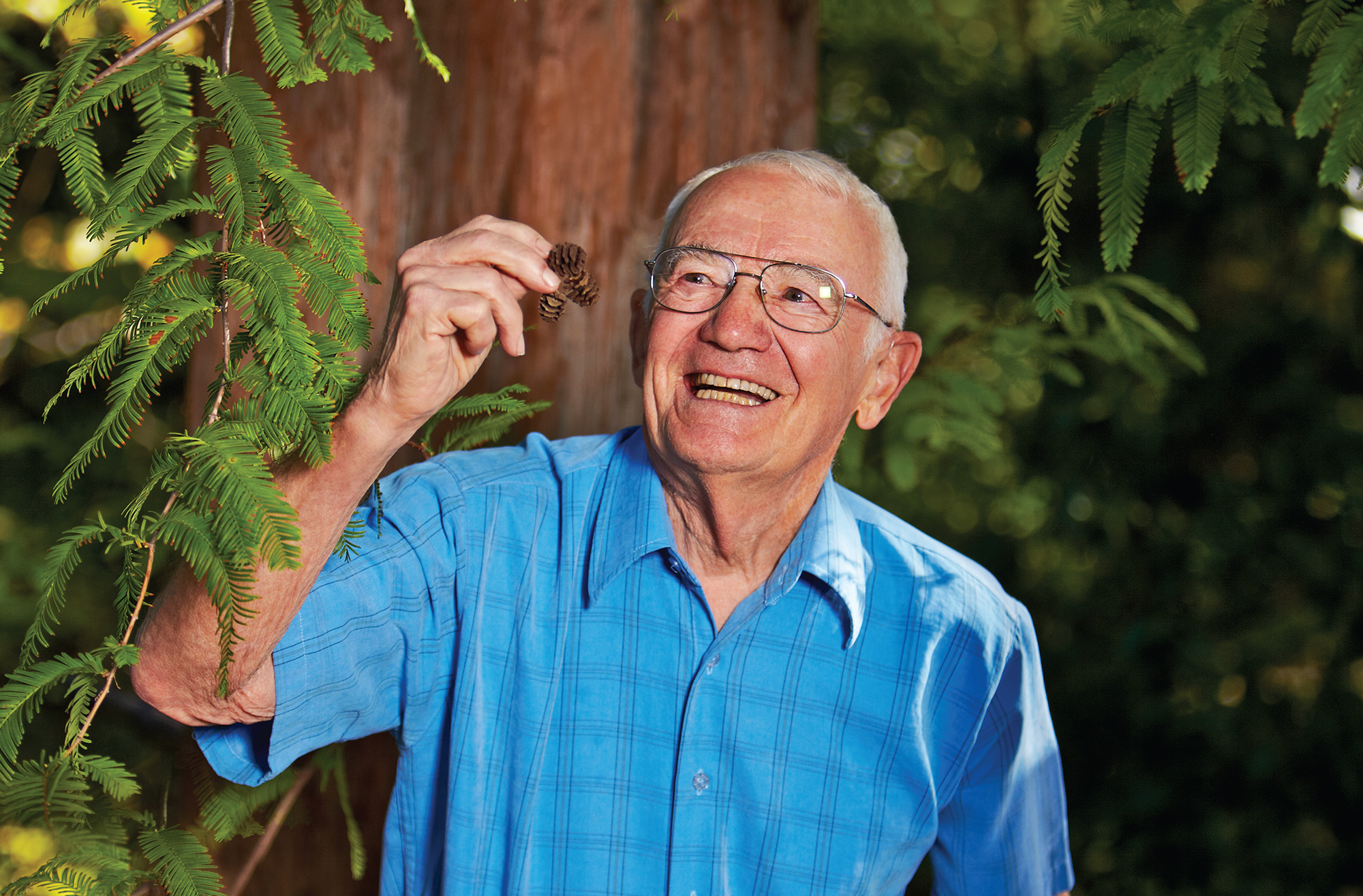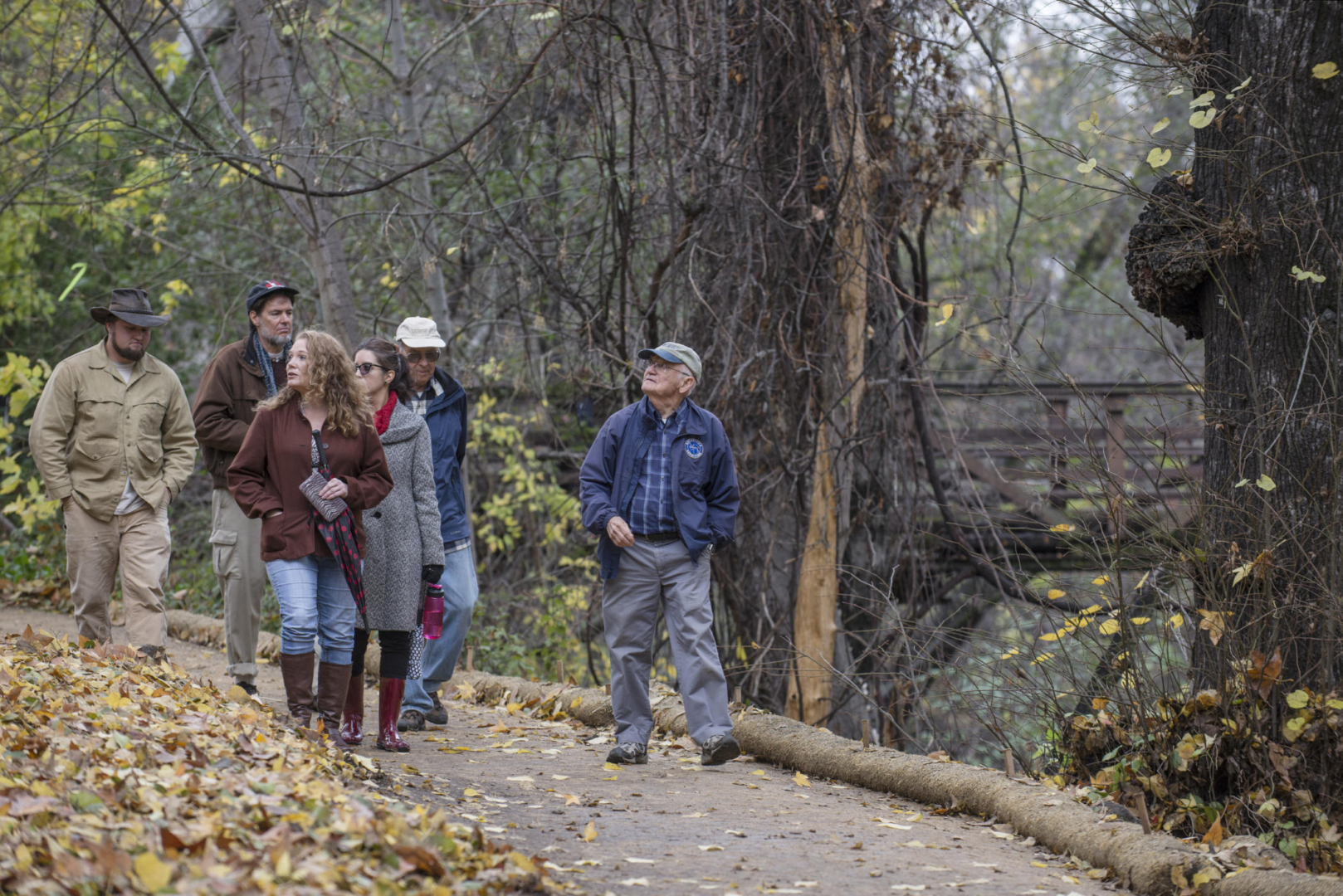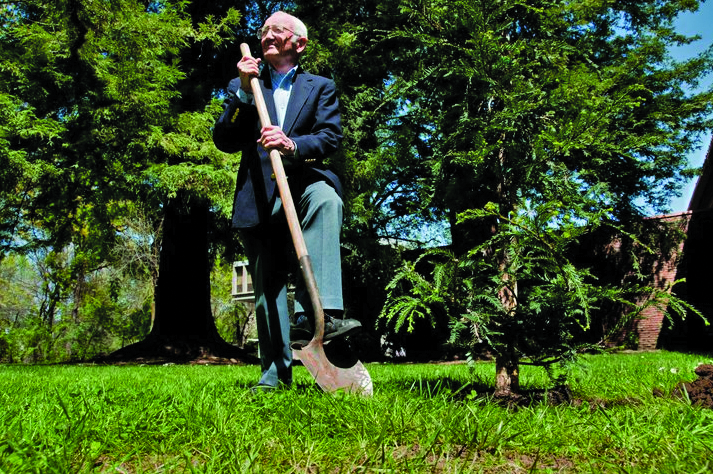Fond Farewell: Biological Sciences Professor Emeritus Wes Dempsey

Professor Emeritus and University benefactor Wesley “Wes” Dempsey, who taught agriculture and biological sciences classes for 38 years, passed away May 1. He was 95.
Born December 2, 1926, in Waltham, Massachusetts, Dempsey grew up on a 30-acre farm and shared a love of plants with his father, a professor of horticulture. He attended Rensselaer Polytechnic Institute in Troy, New York, before joining the US Army in 1945 and becoming a paratrooper. After he was discharged, he used the support of the GI Bill to enroll at Cornell University and earn his bachelor’s degree in plant science in 1949. He then completed a master’s degree in plant science from University of California, Davis, in 1950 and a doctorate in genetics in 1954.
Dempsey considered numerous job offers, including several UC campuses, before his passion for teaching led him to Chico State and the opportunity to start the University’s agriculture program from scratch. As one of its first professors, he taught 22 different courses in his first two years. Within a few years, he moved to the biological sciences department, where he stayed for the rest of his 38-year career.
With expertise in genetics, cytogenetics, plant breeding, and botany, Dempsey conducted research into the genetic traits of fruit flies, mutant and hairless tomatoes, and the insides of pollen grains. His career highlights include a National Science Foundation fellowship in genetics at the University of Wisconsin, Madison, and visiting professorships at the University of Canterbury in New Zealand and the University of Australia at Perth. He also taught summer courses in field biology at the University’s Eagle Lake Field Station from 1979–91.
In 2008, he was the College of Natural Sciences’ first distinguished professor emeritus and inducted into the Emeritus and Retired Faculty Association’s Hall of Honor.
Alumnus Darrell Johnson (Biological Sciences, ’81) still credits a class with Dempsey for changing his life. When he picked “Plant Geography” as an elective, he had no intention of pursuing further coursework in plant sciences or ecology but was soon transformed by Dempsey’s knowledge and easy-going demeanor. It became one of the most memorable courses of Johnson’s college career.
“With field trips to various places around the valley, foothills, and mountains and overnights at Eagle Lake, I became a devotee of our amazing ecology in Northern California,” he said. “One special course with one special professor can change one’s life for the better forever! To say I admired Wes is a major understatement. He lived such a wonderful life, helping so many understand the science and the benefits of flora in our world. “
In addition to his teaching acumen, Dempsey is perhaps most fondly remembered for his passion for the campus arboretum. For more than half a century, he nurtured and defended its thousands of trees, paying particular attention to unusual and native species.
For decades he led 90-minute arboretum tours enlivened by his love of history and delight in storytelling. A longtime member of the University’s Arboretum Committee, he also edited a map and guide to the campus trees in 2001, and in 2009 worked to adorn 300 of the University’s heritage trees with identification tags that list their common and scientific names.

Retired staff member Durbin Sayers said that without a doubt, of his many years with Facilities Management and Services, his most rewarding and inspiring work was collaborating with Dempsey on the arboretum. When a tree showed a sign of decline, Dempsey was always the first call and he would show up to the office within 30 minutes on his 10-speed bicycle, having already inspected the tree.
“Wes’s word was gospel, always giving the tree the benefit of doubt, but also a realist, knowing trees do come to an end,” Sayers said. “His knowledge of our arboretum was absolutely amazing. I kid only slightly when I say he knew all the trees on a first-name basis. He not only knew the genus and species of each, but could tell a personal story about the trees themselves.”
He almost always accompanied Dempsey on his tree tours, as much because it was his job as it was such an incredible opportunity to learn from him. Sayers still remembers one stormy fall day when it was pouring rain and he anticipated they’d have to cancel, but Dempsey was waiting in front of Bidwell Mansion State Historic Park like always, sporting a windbreaker and ready to go.
“That was Wes. Soft-spoken, a good listener, tough as nails, but most of all a teacher,” Sayers said. “Just he and I walked that stormy day through our beautiful campus and the magnificent trees, me reflecting on how incredibly lucky I was to be spending time with this gentle, passionate professor and knower of all things natural science.”
Dempsey had a deep fondness for the valley oaks and incense cedars, as well as the soaring Southern magnolia that graces the entrance to Bidwell Mansion and the American chestnuts near Holt Hall that date to 1870. But perhaps his favorite tree by far was the beautiful and rare dawn redwood near Selvester’s Café-by-the-Creek.

In 2011, he helped lead a rededication ceremony for Bidwell Grove near Ayres Hall, a group of redwood trees first dedicated in 1911, and a young redwood tree was added there in his honor.
“Through his decades of dedicated service, both in the classroom and among our campus trees, Wes Dempsey has inspired generations of students to pursue careers in our natural world,” said President Gayle Hutchinson. “His love and care for our University arboretum and our natural spaces will benefit our campus, our community, and our environment for decades to come.”
Dempsey’s contributions to the University also include the Dempsey Field Research Endowment, funds for the Eagle Lake Field Station, and support for the Biological Sciences Department’s greatest needs. This year, he and his family made a generous $1 million gift to the Big Chico Creek Ecological Reserve (BCCER), the largest gift it has ever received. The Wesley and Phyllis Dempsey Endowment in Memory of David P. Dempsey will directly support the education of the next generation of land stewards and conservationists—from supporting graduate student research in the recently launched master’s-level Wildland Management Program to providing transportation assistance for many of the 1,300 local elementary grade-schoolers participating in BCCER’s Outdoor Classroom program.
Ecological Reserves Director Eli Goodsell said that in the last five years, the entire Dempsey family has helped the reserves grow from a three-person staff to employing over 40 students and staff in land stewardship activities throughout the region.
“Wes is not only a legend for his ecological work, but his family’s altruism has inspired support for our program at an unprecedented level,” Goodsell said. “I left a recent visit with him feeling as though I would need a few lifetimes to even try to match the impact that Wes was able to make in one. I will deeply miss him and will always be thankful for the difference he will continue to make in the success of our students and the health of our planet.”
Dempsey is also credited with creating a map and naturalist tour guide to Yahi Trail in Upper Bidwell Park and often organized hikes with the California Native Plant Society, of which he was a member. He was also a member of the Sierra Club and the Audubon Society and served on the Bidwell Park and Playground Commission and Chico General Plan Committee.
For years, Dempsey was also a naturalist with Mama’s Llamas, North America’s first llama packing company. He would teach participants about biology during treks through California’s backcountry and often said the adventures gave him one more opportunity to share his love of the natural world with others. He was also an enthusiastic backpacker, especially with his four sons.
He retired in 1992 but continued giving tours of the campus trees and native plant walks until a few years ago. His favorite pastime was to be in nature, and in recent years, he liked to walk the grounds at The Terraces by California Park Lake.
He is survived by his wife, Phyllis; sons Tom, Paul, and Jim Dempsey, and their partners; five grandchildren; and numerous nieces and nephews. He was preceded in death by his son, David Dempsey. Memorial contributions in Dempsey’s name can be made to the Dempsey Field Research Award, which supports biological sciences students with their research, or to your favorite environmental organization.
The University flag will be lowered Friday, May 6, in his memory.
A memorial reception will be held from 2-4 p.m. May 27 at the Lodge at The Terraces in Chico.


